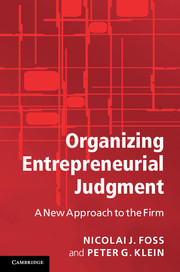Book contents
- Frontmatter
- Contents
- Figures
- Preface
- 1 The need for an entrepreneurial theory of the firm
- 2 What is entrepreneurship?
- 3 Entrepreneurship: from opportunity discovery to judgment
- 4 What is judgment?
- 5 From shmoo to heterogeneous capital
- 6 Entrepreneurship and the economic theory of the firm
- 7 Entrepreneurship and the nature and boundaries of the firm
- 8 Internal organization: original and derived judgment
- 9 Concluding discussion
- References
- Index
4 - What is judgment?
Published online by Cambridge University Press: 05 June 2012
- Frontmatter
- Contents
- Figures
- Preface
- 1 The need for an entrepreneurial theory of the firm
- 2 What is entrepreneurship?
- 3 Entrepreneurship: from opportunity discovery to judgment
- 4 What is judgment?
- 5 From shmoo to heterogeneous capital
- 6 Entrepreneurship and the economic theory of the firm
- 7 Entrepreneurship and the nature and boundaries of the firm
- 8 Internal organization: original and derived judgment
- 9 Concluding discussion
- References
- Index
Summary
As we argued in the previous chapter, the key construct that links entrepreneurship and the theory of the firm is entrepreneurial judgment. But what is judgment, exactly? So far we have treated judgment in a highly formal and abstract way, as that which generates profit and loss. Here we are consistent with other approaches to the entrepreneurial function: Schumpeter takes entrepreneurship to be that which generates economic growth, while Kirzner treats it as that which causes markets to equilibrate. In all of these cases, entrepreneurship itself is largely a black box; it is invoked, instrumentally, to explain a particular set of phenomena.
Judgment, to be more specific, is residual, controlling decision- making about resources deployed to achieve some objectives; it is manifest in the actions of individual entrepreneurs; and it cannot be bought and sold on the market, such that its exercise requires the entrepreneur to own and control a firm. To simplify, we have collapsed into this notion the acts of creating and evaluating opportunities, and deciding on which resources need to be assembled, how they need to be combined, etc. to realize the opportunity. We have made the point that judgment is a meaningful notion of decision-making that is intermediate between decision-making via formalizable rules and pure luck or random behaviour (see Casson, 1982). It is the kind of decision-making that concerns unique business investments for which it is difficult, or even impossible, to assign meaningful probabilities to outcomes, or even to specify the set of possible outcomes itself (Shackle, 1972; Zeckhauser, 2006). When confronted with such a situation, individuals will reach different decisions, even if they share the same objectives and the data are presented to them in exactly the same manner, because they have access to different information, interpret the data in different ways, and so on (Lachmann, 1977; Casson and Wadeson, 2007). In Bayesian terms, priors are diffuse, and updating rules may differ.
- Type
- Chapter
- Information
- Organizing Entrepreneurial JudgmentA New Approach to the Firm, pp. 78 - 104Publisher: Cambridge University PressPrint publication year: 2012
- 1
- Cited by

